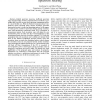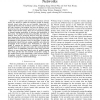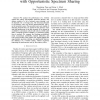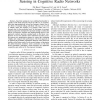CORR
2008
Springer
15 years 27 days ago
2008
Springer
Abstract--We consider power control in cognitive radio networks where secondary users identify and exploit instantaneous and local spectrum opportunities without causing unacceptab...
98
Voted
CORR
2008
Springer
15 years 27 days ago
2008
Springer
We study two distinct, but overlapping, networks which operate at the same time, space and frequency. The first network consists of
122
Voted
CORR
2010
Springer
15 years 27 days ago
2010
Springer
The problem of distributed learning and channel access is considered in a cognitive network with multiple secondary users. The availability statistics of the channels are initially...
108
Voted
WICON
2008
15 years 2 months ago
2008
We consider the problem of efficient opportunistic spectrum access in cognitive radio networks where there are multiple secondary users trying to share access to multiple channels...
104
click to vote
ICC
2007
IEEE
15 years 7 months ago
2007
IEEE
—Limited spectrum resources, inefficient spectrum usage and increasing wireless communication necessitates a paradigm shift from the current fixed spectrum management policy to...
94
Voted
ICC
2007
IEEE
15 years 7 months ago
2007
IEEE
— We consider opportunistic spectrum access (OSA) which allows secondary users to identify and exploit instantaneous spectrum opportunities resulting from the bursty traffic of ...
109
Voted
ICC
2007
IEEE
15 years 7 months ago
2007
IEEE
— In cognitive radio networks, the secondary network (users) are allowed to utilize the frequency bands of primary network (users) when they are not currently being used. To supp...
110
Voted
GLOBECOM
2007
IEEE
15 years 7 months ago
2007
IEEE
Abstract—We explore the performance tradeoff between opportunistic and regulated access inherent in the design of multiuser cognitive radio networks. We consider a cognitive radi...
GLOBECOM
2007
IEEE
15 years 7 months ago
2007
IEEE
— We analyze the performance of a wireless system that allows opportunistic spectrum sharing. The system consists of a set of primary users sharing a set of channels over a cover...
108
Voted
GLOBECOM
2007
IEEE
15 years 7 months ago
2007
IEEE
— Spectrum sensing is a key enabling functionality in cognitive radio (CR) networks, where the CRs act as secondary users that opportunistically access free frequency bands. Due ...




